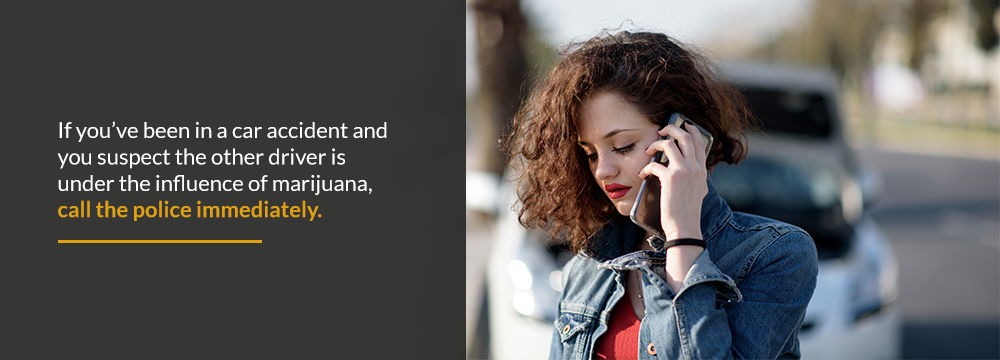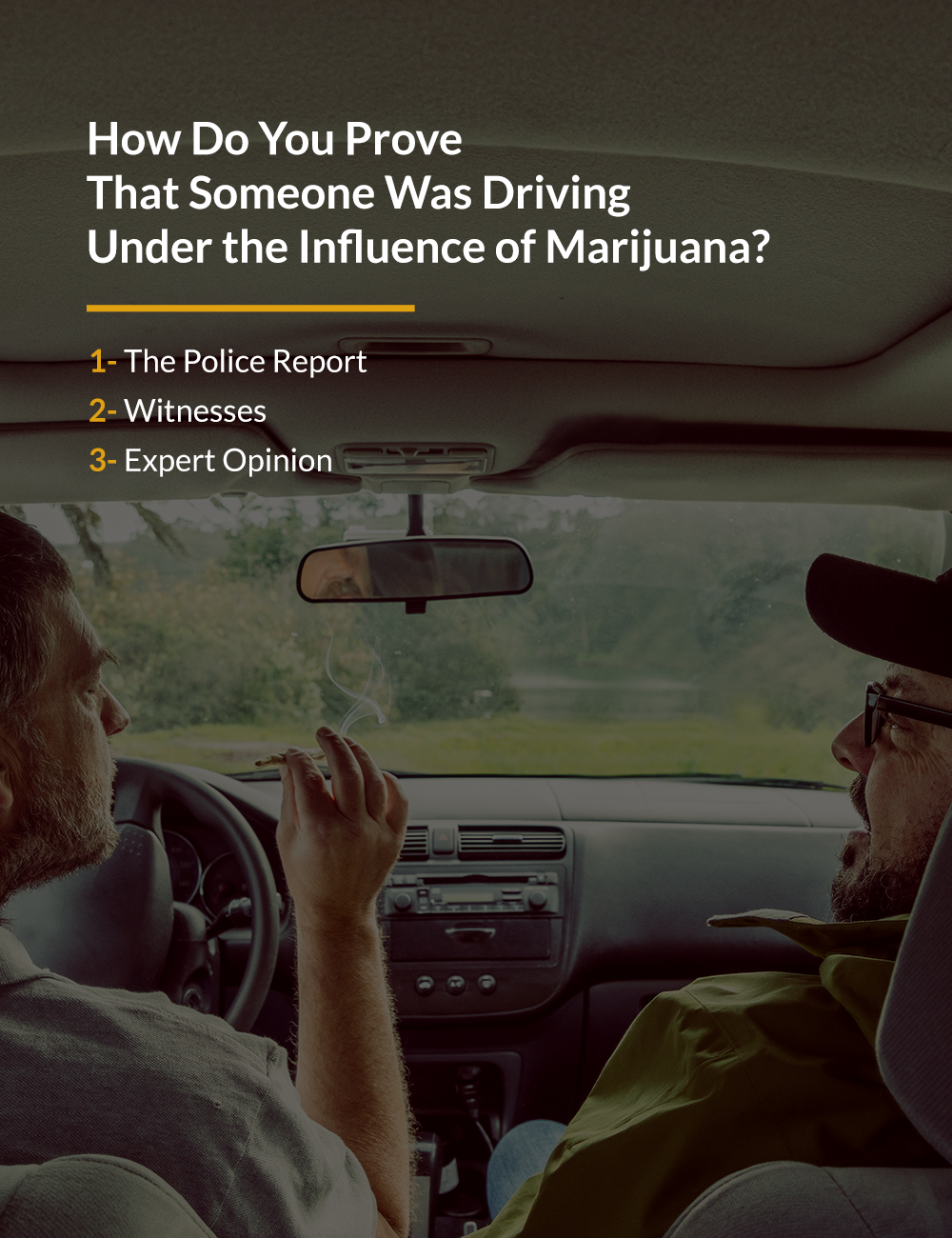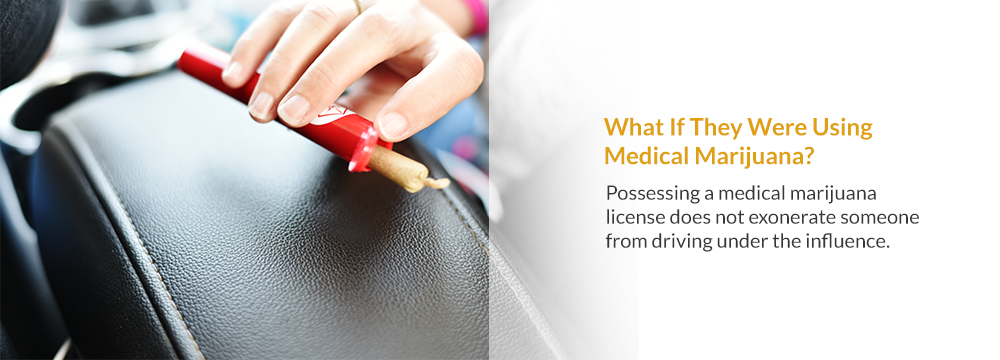Driving while “buzzed” is an increasing problem in the U.S. In 2009, the National Highway Transportation and Safety Administration (NHTSA) found that 18% of all drivers involved in a fatal car accident were high on some kind of drug. In 2014, the Substance Abuse and Mental Health Services Administration (SAMHSA) estimated that 10.1 million Americans (4.1%) were driving while under the influence of drugs like marijuana
These statistics were compiled before many states legalized medical or recreational marijuana so that 4.1% figure is no doubt much higher.
Like alcohol, however, if a driver has consumed too much of any drug, even if legal in many states, and they hit your vehicle or strike you while you are legally crossing the street, they can be sued for personal injuries.
If you have been involved in an accident with a vehicle, and you believe that the other driver was under the influence of marijuana, you should contact an experienced personal injury lawyer immediately.
Delaware’s Law About Driving a Vehicle While High on Marijuana
It is illegal to drive under the influence of legal or illegal drugs in Delaware. In many ways, it is like driving while under the influence of alcohol. If you’ve been in an accident with a drunk driver, it is often easy to determine their condition — the driver or their car often smells of alcohol, their speech is slurred, they are unsteady, and their eyes are often red and puffy. Police can use a breathalyzer to determine if the driver is above the 0.08% blood-alcohol level, which determines if someone is driving under the influence.
Driving under the influence basically means that the presence of alcohol or a drug in the driver’s blood system makes them incapable of driving safely.
Determining if someone who’s been in a car accident is under the influence of drugs can be more difficult.
In July 2017, the NHTSA reported to Congress that it can be difficult to determine if someone’s driving is impaired by using legal or illegal drugs. It’s easier to assess the usage of some kinds of drugs than others. Cocaine, for instance, only stays in the body for a day or two, but marijuana may linger in the body for as long as a month.
Delaware’s approach to this problem is “per se” drug driving laws. Basically, if a motorist that police believe is under the influence of drugs, receives a blood or urine test and that test shows any detectable amount of marijuana in their system, they are charged with Driving Under the Influence (DUI). Delaware is one of 15 states that uses the per se drug law and one of 12 that has a zero-tolerance policy.
What If a Driver Hits Me While High?
If you have been involved in a vehicle accident and you suspect the other driver is under the influence of marijuana, there may be signs that can help confirm your suspicions.
First, if a driver has been smoking marijuana while driving, you will likely be able to smell marijuana smoke on their person or in their car.
Other signs that a driver is operating under the influence of marijuana include:
- Disorientation
- Drowsiness
- Image Distortion
- Altered Time and Space Perception
- A Heightened State of Euphoria
- Paranoia

If you’ve been in a car accident and you suspect the other driver is under the influence of marijuana, call the police immediately. There are several reasons for this.
- If the driver is impaired, it’s important that they don’t continue driving.
- While not all police are specifically trained to detect marijuana, there are ways they can. Police are increasingly giving roadside blood tests on drivers they suspect of being buzzed, as well as monitoring their heart rate, which is noticeably higher when a driver is impaired by marijuana.
- If you eventually decide to file a personal injury lawsuit against the other driver, having a police report that shows the other driver may have been driving under the influence greatly increases your chances of success. While police reports are not admissible in court, if the report notes that the police cited the other driver for a DUI, it can help establish that the other driver was negligent.
At the accident scene, if you are not seriously injured, it’s best to gather evidence from afar:
- Check to see if any individuals involved in the crash need immediate medical attention.
- If the other driver is awake and conscious, do not become confrontational. If they seem belligerent or angry, wait for the police to arrive to exchange insurance information.
- If there are any witnesses, talk to them and get their personal information.
- Take notes about the location of the accident, the weather and road conditions.
- Use your smartphone camera to take pictures of your car and the other drivers’ car and any other evidence that would help in a lawsuit case, such as pictures of brake skidmarks on the road left by the other driver.
- Using the video function on your smartphone, record the scene, especially how the other driver is acting.
What to Do If You See Them Dumping Their Stash
If the other driver tries to destroy or remove evidence such as a stash of marijuana, use your smartphone to record them doing so, but do it from a safe distance.
Determining Probable Cause
Probable cause for a police officer to determine if a driver was under the influence of marijuana includes:
- The smell of marijuana in the car or on the person
- The person is carrying marijuana
- The officer believes the driver is under the influence of marijuana and conducts a search of their car and finds marijuana
- The other driver is clearly impaired
If any of these conditions exist, this gives the police probable cause to test for impairment.
How Do You Prove That Someone Was Driving Under the Influence of Marijuana?

If you file a personal injury claim against the driver that you suspect was impaired by marijuana use, your lawyer will look at several important factors:
1. The Police Report
This is why it’s important to call the police if you suspect the other driver is impaired by marijuana. When the police come to the scene of an accident involving an impaired driver, they will prepare an accident report in which they may state that they believe that the car accident was caused by a driver smoking marijuana.
Sometimes the police report will indicate that the other driver was cited or arrested for DUI. This report provides important information for your attorney to argue the other driver was negligent.
2. Witnesses
Your lawyer may consider testimony and accounts from witnesses as to what they witnessed about the behavior of the other driver. They might get these witness accounts from police reports or from the notes you took at the scene. Perhaps, they saw them fall or noticed that they were acting combative. They may have observed that their speech was mumbled or slurred or smelled the odor of marijuana either coming from the driver’s car or on the driver themselves.
3. Expert Opinion
Your lawyer can call on medical or law enforcement experts who can testify as to how the other driver performed using standard sobriety tests, such as walking a straight line or standing on one foot. These experts may also testify about the results of any blood or urine tests that indicated the presence of marijuana.
Recovering Compensation From the Impaired Driver
When it comes to auto insurance, Delaware is an “at fault” or “fault” state. So if a driver under the influence of marijuana has hit your car and you have been injured, you have two means of recovery:
- File an insurance claim with your insurer using your insurance. Every driver in Delaware is required to carry Personal Injury Protection (PIP) coverage that consists of a minimum of $15,000 per person and $30,000 per accident. This kind of coverage may be ideal if the damage to your car and your injuries are relatively minor. States enacted PIP coverage to help drivers get paid faster by their insurance companies after a motor vehicle accident.
- File a personal injury lawsuit in court. If your car has suffered serious damage or if you or your passengers have been seriously injured, the best idea may be to file a personal injury lawsuit, which will include compensation for pain and suffering.
Normally, damages in automobile accident lawsuits include compensation for:
- Medical costs now and in the future
- Past and future income losses
- Permanent injuries
- Pain and suffering
Typically, punitive damages are not awarded in automobile accident lawsuits. However, if you are struck by a DUI driver, your attorney may be able to argue for punitive damages based on the fact that the driver was impaired, as this may indicate a level of wanton or willful conduct. In Delaware, there is no set rule for determining punitive damages. Instead, a jury awards them on a case-by-case basis
Delaware also uses a comparative negligence rule. This means if you are found to be partially responsible for the accident (you must be 50% or less at-fault to recover) and if a jury awards you damages, your award will be reduced by the percentage that you are considered responsible for the accident.
For instance, say you were struck from behind by a marijuana-impaired driver, and during the trial, it’s discovered that your taillights had burnt out. The defendant’s attorney may be able to argue that you are partially to blame because you didn’t get your taillights fixed. If the judge or jury decides that you are 20% responsible for the accident and you are awarded $100,000, you would only be able to collect $80,000.
What If They Were Using Medical Marijuana?

Possessing a medical marijuana license does not exonerate someone from driving under the influence. The Delaware Medical Marijuana Act prohibits any driver with a medical marijuana license from “operating, navigating or being in actual physical control of any motor vehicle, aircraft or motorboat while under the influence of marijuana.”
It also states, “Nothing in this chapter shall be construed to prevent the arrest or prosecution of a registered qualifying patient for reckless driving or driving under the influence of marijuana where probable cause exists.”
The act does, however, give medical marijuana patients a break on the state’s “per se” drug laws, reflecting the fact that a medical marijuana patient may be using marijuana regularly to deal with the medical condition. The law states a driver with a medical marijuana license “shall not be considered to be under the influence of marijuana solely because of the presence of metabolic heights or components of marijuana.”
So, if a driver who smoked or ingested medical marijuana got into a car accident, they could be cited for a DUI. In fact, when someone is taking any legal or illegal drug that could impair their ability to drive a car, and they are involved in a car accident or pulled over by the police, they can be charged with a DUI.
Perhaps the best-known example of this concerned the golfer Tiger Woods. He was asleep in his parked car when state police checked it. Woods was incoherent, and when police questioned him, he was not even sure of where he was. It turned out that he had taken too many of the drugs prescribed for his back pain at the same time.
Woods was eventually sentenced to one year on probation, but if he had been involved in an accident at the time, he would’ve been liable for any damages. The same is true of any driver in Delaware who operates a vehicle while under the influence of marijuana, even if they have a medical marijuana license.
When it comes to marijuana use and accident liability in Delaware, this suggests that someone could be held responsible for damages they caused while driving under the influence of marijuana, even if they have a medical marijuana license.
Contact Morris James Personal Injury Lawyers
If you’ve been in a car accident, you’re likely to be “under the weather.” The last thing you need to do is to spend time hunting down witnesses and documentation to prove your case when you should be doing your best to recover from your injuries.
That’s why you should speak with the Morris James Personal Injury Group. Our knowledgeable attorneys have over 150 years of combined experience in dealing with personal injury accidents. We help our clients receive full and fair compensation. We know the kind of tricks used by insurance adjusters and attorneys for the impaired driver who hit you, and we know how to counter them.
If you have been in an accident with a DUI driver, talk with one of our knowledgeable attorneys today. We have several offices in Delaware where you can reach us:
- Wilmington: 302-888-6800
- Wilmington-West: 302-655-2599
- Newark: 302-368-4200
- Dover: 302-678-8815
- Georgetown: 302-856-0015
- Rehoboth Beach: 302-260-7290
You can also reach us via our contact us page where you can leave us details on how we can get a hold of you and tell us about your case.







